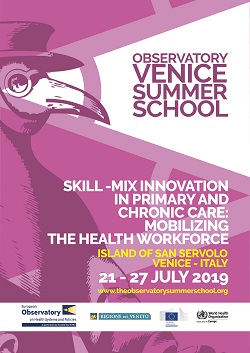Observatory Venice Summer School 2019

21–27 July 2019, Venice, Italy
What: “Skill-mix innovation in primary and chronic care: mobilizing the health workforce”
The Observatory Venice Summer School 2019 is a short, intensive course. It is a week of learning, interacting, studying, debating, and sharing experiences with other policy-makers, planners and professionals to understand, discuss and improve health workforce strategies and policies.
When: 21–27 July 2019
Who: The course is aimed at senior and mid-level policy-makers, civil servants and professionals. If you are involved in steering health care services or are looking at development, training or the performance of the primary and chronic care health workforce at international, national or regional level – then the Observatory Venice Summer School is for you.
Objectives
- Understanding definitions of skill-mix innovation and analysing skill-mix trends, drivers and outcomes in countries.
- Reviewing policy and other governance approaches for creating and implementing skill-mix innovation (e.g. regulation, education, payment policies).
- Assessing skill-mix innovation for integrated care (including the hospital interface).
- Preparing for future challenges and trends.
Why skill-mix innovation in primary and chronic care?
Skill-mix innovation is one strategy countries employ when implementing primary and chronic care reforms for health systems performance improvement and sustainability. European countries are committed to strengthening primary care as documented by the declarations of Alma Ata and Astana from 1978 and 2018. They also advance chronic care responding to the demographic changes and the challenging management of complex and costly multi-morbidities. They also seek to unburden the hospital sector from inappropriate use. In this regard skill-mix innovation in the health workforce plays a crucial role strengthening primary and chronic care.
- Strengthening primary and chronic care is one of the key strategies adopted by many European countries to improve health system performance and sustainability.
- One way to support this strategy is to make better use of the current and future health workforce through skill-mix innovation.
- This is particular relevant given the sheer size of the health workforce in Europe and the healthcare expenditure spent on health workers.
- There is also a shift from hospital-based care towards ambulatory care, especially primary and chronic care, for which health workforce issues have not yet received enough attention.
- The demographic challenge applies not only to the patient, but also to an ageing health workforce and a shrinking pool of labour market entrants.
- But ultimately, all health workforce innovations must be evaluated with regards to their contribution to health system performance.





















